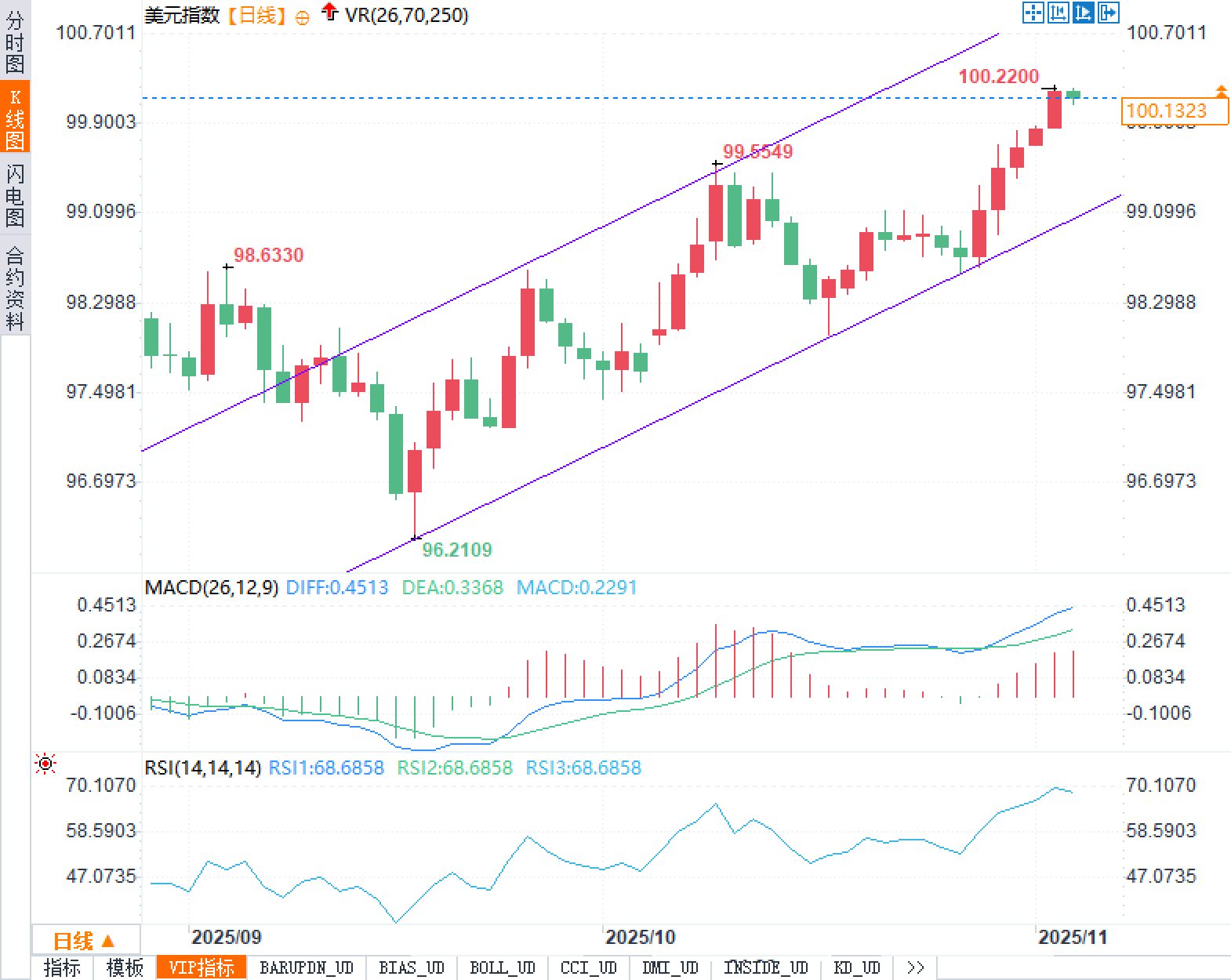ADP report closes in: Is the dollar above 100 awaiting its verdict?
2025-11-05 17:48:53

Fundamentals
The main theme of recent macroeconomic trends is "weakening employment – policy trade-offs – re-anchoring of interest rate expectations." Tonight at 21:15, Automatic Data Processing (ADP) will release its October private sector employment data. The market consensus is for an increase of 24,000 jobs, compared to a net decrease of 32,000 in September. ADP Research's preliminary estimate indicates that net employment grew by an average of approximately 14,250 jobs over the four weeks ending October 11. If the October figure is indeed 24,000, this will somewhat offset the negative growth in September, but it will still be significantly lower than the long-term average of approximately 150,000 jobs per month over the past 15 years, structurally reinforcing the indication of a "cooling labor market."
More challenging is data availability: the government shutdown has entered its fifth week, which could very well result in the absence of JOLTS job openings and non-farm payrolls (NFP) data this week. In the short term, the market and the Federal Reserve will rely more on alternative and high-frequency indicators to assess the employment situation. In other words, the marginal impact of the ADP reading is amplified; it is no longer just a "preview," but rather an "anchor" directly influencing interest rate paths and dollar trading amidst the data gap.
From a policy perspective, the Federal Reserve cut interest rates by 25 basis points on October 29th. However, there is a clear division within the committee regarding the subsequent pace: one side is concerned about weak employment and insufficient growth momentum, advocating for continued policy support; the other side emphasizes the resilience of inflation and the risk of a double-dip recession, and is more concerned about "excessive easing." This divergence is also reflected in interest rate pricing—the probability of another 25 basis point rate cut in December has fallen from "over 90%" last week to "64%." This downward revision is a significant catalyst for the recent strengthening of the US dollar.
If the ADP report is higher than expected, market concerns about the employment outlook may ease temporarily, and the focus of trading will shift back to the correlation between inflation and nominal interest rates. The Fed's hawkish stance will be supported, and the dollar index may retest the upper limit of its channel and seek a breakout. Conversely, if there is a significant drop below expectations, or even continued negative growth – a "second disappointment" – the interest rate path will tilt towards faster easing. The downward shift of the yield curve will weaken the dollar's relative interest rate advantage, and the dollar index may fall from the upper limit and enter a period of consolidation at higher levels within the channel.
In terms of timing, the ADP data will be released at 21:15 tonight. The data gap coupled with increased divergence means that today's "second-order effect"—the repricing of bets on the December meeting—will be directly reflected in the daily trend of the US dollar index.
Technical aspects:
The daily chart shows that the US dollar index is steadily rising along the upward channel. The lower rail of the channel has moved up from the low of 96.2109, and the stage highs have been formed successively at 98.6330, 99.5549 and 100.2200. The structure is complete and the slope is balanced. The current price is approaching the upper edge of 100.2200, which is a "strong consolidation near the resistance". In the MACD indicator, the DIFF is 0.4513, the DEA is 0.3368, and the histogram is 0.2291 and is expanding, indicating that the trend momentum is still accumulating; the RSI (14) reading is about 68.6858, which is close to the overbought threshold of 70, indicating that the upward attack is accompanied by short-term overheating.

In terms of price levels, if the price breaks through 100.2200, it may continue to challenge the 100.70 area. If it fails to break through and a long upper shadow or high-volume stagnation occurs, it is likely to retrace to the 99.50 area to test the middle of the channel. Further support levels to watch are the horizontal consolidation zone around 98.30 and 97.50. Overall, with "bullish momentum, relatively high price, and resistance approaching," the battle between bulls and bears is about to reach its peak.
Market Outlook
Short-term (next 1-2 weeks): The core variables are the strength of the ADP employment report and its repricing of the December meeting. Scenario 1: If the ADP report is above 24,000 and accompanied by an upward revision, the US dollar index is expected to amplify its momentum, attempting to break through 100.2200 and seek a price target of 100.70. Subsequently, it will likely enter a "breakout confirmation - pullback - further upward movement" path between 100.22 and 100.70. Technically, it is necessary to observe whether the pullback after the breakout holds above 100.2200. Scenario 2: If the reading is significantly lower than expected, or even records a net decrease again, the price may encounter resistance at the upper edge and fall back. The first pullback target is 99.50. Once this level is breached, the 98.30-97.50 range will serve as secondary support within the channel, and the trend will turn into high-level oscillation.
In the medium term (next 1-3 months): the policy path will be determined by the balance between declining employment and resilient inflation. If inflationary pressures rise temporarily while employment weakens only moderately, the Federal Reserve will be cautious, and the pace of interest rate cuts may be slow, with the dollar maintaining its upward trend within its channel. However, if employment weakens continuously, job vacancies decrease, wage expansion slows, and inflation falls significantly, the yield curve will shift downward more rapidly, and the dollar index may transition from an upward channel to a range or pullback structure. At that time, it will be necessary to pay attention to whether 98.30 will become a key turning point, transforming from resistance to support.
- Risk Warning and Disclaimer
- The market involves risk, and trading may not be suitable for all investors. This article is for reference only and does not constitute personal investment advice, nor does it take into account certain users’ specific investment objectives, financial situation, or other needs. Any investment decisions made based on this information are at your own risk.





















